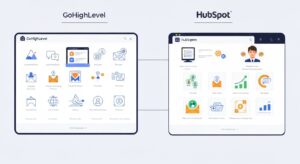The 5-Minute Rule: Why Speed Wins in Sales

Introduction
Sales has always been a race against time, but now that everyone is so linked, time goes by even faster. Prospects have more options, less time to pay attention, and higher standards for getting help right away. There are a lot of useful leads that agencies and sales teams miss when they don’t follow up. But companies that act quickly get a clear edge when it comes to building trust and getting business.
Because of this, there is a rule called the “five-minute rule” that says you should contact a lead within five minutes of their question. This greatly increases the chances of turning them into a customer. If agencies want to stay competitive, learning this rule is not only the right thing to do, it’s also the only way to stay alive. CRM fast response sales have become an important part of this change, making sure that technology gives the speed that people can’t always do on their own.
Why the Five-Minute Rule Matters
The five-minute rule is based on facts, not opinions. Harvard Business Review released a groundbreaking study that showed companies that responded to new leads within five minutes were much more likely to qualify those leads than companies that didn’t respond for at least thirty minutes. Response rates dropped sharply over time, showing a big difference that wasn’t small (Harvard Business Review).
It’s easy to understand why this works. Prospects get in touch when they are most interested or in need of something. A quick answer takes advantage of this energy and shows that you are paying attention and are a professional. A slow reaction, on the other hand, lets doubt, distraction, or a competitor’s pitch happen.
When many companies are competing for the same clients, speed stands out as the most obvious way to tell them apart. Many times, prospects choose the company that made them feel important over the one that was best or cheapest.
The Cost of Delayed Responses
Not following up quickly can lead to more problems than just losing one lead. Delays hurt trust and leave bad feelings that last long after the first touch. If a possible client waits hours or days for a response, they might wonder how well the business can handle tasks, meet schedules, or put relationships first.
Competitors take advantage of this chance. Agencies with CRM systems that are built to respond quickly always get leads before competitors who are more slowly can act. In the long run, this adds up to a big income gap. Not only do they lose deals, but people start to think less of the slow service as well.
Late answers also slow things down in real life. After cold leads who are no longer interested, sales teams waste more time than on warm possibilities who are still interested. It can be hard to break out of a cycle of bad performance when this happens over and over again.
How CRM Fast Response Sales Solves the Problem
It is possible to follow the five-minute rule thanks to technology. If the sales team doesn’t have any help, it’s not fair to expect them to answer every question in minutes. This is where quick CRM sales tools come in.
These days, CRM systems have automation tools that send follow-up emails as soon as a lead gets a resource, fills out a form, or clicks on an ad. The lead is contacted right away by email, text message, or phone, and they are often given a way to act, like setting up a meeting.
The buyer will know that their question was heard and is important because of the quick answer. It also gives the sales team time to follow up in a more focused way without making the client wait. People who are in charge can see the flow in real time, which holds them responsible and lets them compare response times to standards.
The five-minute rule can be used on a big scale with CRM systems, which mix technology with human touch. This is true even for businesses that deal with dozens of leads every day.
The Psychology of Speed and Trust
One of the most strong forces in sales psychology is the link between speed and trust. A quick answer shows that a company is paying attention, is well-organized, and wants to help. Potential customers automatically connect speed with skill, making a good impression before the sales pitch even starts.
This early faith stays with the couple for the rest of their time together. Prospects are more likely to have deeper talks, share their problems, and think about answers when they feel like their time is valued. On the other hand, answers that are too slow plant doubt that is hard to get rid of later, no matter how good the deal is.
When agencies always respond quickly, they place themselves as more than just suppliers; they become trusted partners. This psychological edge is very useful in markets where relationships are just as important as price.
Real-World Evidence of the Five-Minute Advantage
More and more research shows how important it is to respond quickly to leads. InsideSales.com (now XANT) looked at millions of sales contacts and proved that after the first five minutes, the chance of reaching a lead drops greatly, and the chance of a deal drops even more as the wait grows.
Also, Salesforce studies show that sales teams that do a good job are more likely to use automation tools that let them respond more quickly. This clearly shows a link between using technology and making more money (Salesforce State of Sales).
These results show that speed is not just a trend; it is a real factor in making sales across all fields. For businesses that don’t change, competing with one hand tied behind their back is a bad choice.
Building a Five-Minute Response Culture
Automation in CRM is important, but tools are not enough on their own. Also, agencies need to make sure that being quick is seen as an important part of their business. This starts with leaders being clear about what they expect and using response time targets to measure success.
It’s also important to train. Not only do sales workers need to have the tools to react quickly, they also need to know how to have important first contacts. If your quick response feels impersonal or programmed, it might not help you reach your goal. On the other hand, a well-written letter makes a real link.
After a while, agencies that adopt this mindset find that responding quickly is something they do naturally. It’s no longer a job that needs to be handled; it’s now a standard of quality that guides how the business works.
The Future of Fast Response in Sales
Speed will become much more crucial in sales as time goes by. Communication will be even more precise and on time because to AI, predictive analytics, and superior technology. Companies will get more from this new technology if they buy CRM tools right away that are easy to use.
Soon enough, everyone will likely answer in less than five minutes. When robots, AI-driven custom, and quick plan tools are used together, it will be even faster to get a real answer. As client needs change, companies that don’t adapt may start to fall behind.

Conclusion
Is the five-minute rule only good for pitches? It’s not a joke. One good business will do better than others based on this rule. When prospects have a lot of options, they often pick the best one.
CRM gives businesses the tools and organization they need to make sales quickly. By responding to this method, you can build trust, improve the customer experience, and speed up the growth of your income.
After 2025, the crm fast response sales will be the most important, not the ones that are the biggest or has the most history. Sales are faster when you have the right processes in place. Every firm can make deals faster, build better relationships, and ensure long-term success.






